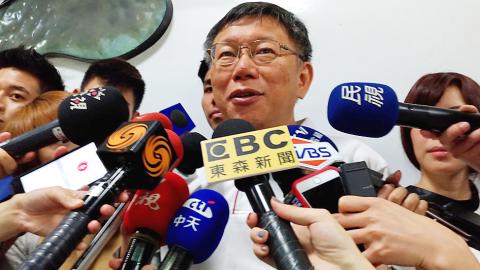People can consider the statues of historical figures on school campuses as just stone and not care about their meaning, Taipei Mayor Ko Wen-je (柯文哲) said yesterday, adding that he is planning a way to deal with the issue “properly.”
Ko made the remarks at the launch of the Taipei City Government’s annual municipal administration summer camp for students. The camp’s first session is attended by undergraduate and graduate students.
A student from National Chiao Tung University said he used to see Chiang Kai-shek’s (蔣介石) bronze statue at the Taipei Municipal Jianguo High School’s front gate when he was a student there, and asked Ko what the city government would do regarding such statues on campuses and in government institutions to ensure transitional justice.

Photo: Chang Yi-chen, Taipei Times
“That is a sharp question to ask in front of all these journalists,” Ko jokingly said. “There are many statues of historical figures in Taiwan, such as Sun Yat-sen (孫中山), Wu Chih-hui (吳稚暉), Chiang, Lin Sen (林森) and Yu You-jen (于右任), so I have been thinking about whether I should deal with the statues altogether, or only the ones of Chiang.”
Ko said he has been reading Buddhism’s Diamond Sutra and was inspired by the four manifestations of self, adding: “It is a world full of labels, meaning that you label an object you see and react to the object because of that label.”
“Honestly, why do you not just see them [the statues] as stone?” Ko said, quoting the Zen Buddhist teaching: “It is not the wind or the flag that is moving, it is your heart that is moving.”
“The meaning of the statue is given to it by the viewer, but the question is why do they care so much about it?” Ko asked.
“After being mayor for a while, I realized that most people only pursue a stable life with ensured meals every day, they do not care so much about Taiwanese independence or unification with China, nor about the pan-green or pan-blue political camps,” he said.

Global bodies should stop excluding Taiwan for political reasons, President William Lai (賴清德) told Pope Francis in a letter, adding that he agrees war has no winners. The Vatican is one of only 12 countries to retain formal diplomatic ties with Taiwan, and Taipei has watched with concern efforts by Beijing and the Holy See to improve ties. In October, the Vatican and China extended an accord on the appointment of Catholic bishops in China for four years, pointing to a new level of trust between the two parties. Lai, writing to the pope in response to the pontiff’s message on Jan. 1’s

A Vietnamese migrant worker on Thursday won the NT$12 million (US$383,590) jackpot on a scratch-off lottery ticket she bought from a lottery shop in Changhua County’s Puyan Township (埔鹽), Taiwan Lottery Co said yesterday. The lottery winner, who is in her 30s and married, said she would continue to work in Taiwan and send her winnings to her family in Vietnam to improve their life. More Taiwanese and migrant workers have flocked to the lottery shop on Sec 2 of Jhangshuei Road (彰水路) to share in the luck. The shop owner, surnamed Chen (陳), said that his shop has been open for just

TAKE BREAKS: A woman developed cystitis by refusing to get up to use the bathroom while playing mahjong for fear of disturbing her winning streak, a doctor said People should stand up and move around often while traveling or playing mahjong during the Lunar New Year holiday, as prolonged sitting can lead to cystitis or hemorrhoids, doctors said. Yuan’s General Hospital urologist Lee Tsung-hsi (李宗熹) said that he treated a 63-year-old woman surnamed Chao (趙) who had been sitting motionless and holding off going to the bathroom, increasing her risk of bladder infection. Chao would drink beverages and not urinate for several hours while playing mahjong with friends and family, especially when she was on a winning streak, afraid that using the bathroom would ruin her luck, he said. She had

MUST REMAIN FREE: A Chinese takeover of Taiwan would lead to a global conflict, and if the nation blows up, the world’s factories would fall in a week, a minister said Taiwan is like Prague in 1938 facing Adolf Hitler; only if Taiwan remains free and democratic would the world be safe, Deputy Minister of Foreign Affairs Francois Wu (吳志中) said in an interview with Italian newspaper Corriere della Sera. The ministry on Saturday said Corriere della Sera is one of Italy’s oldest and most read newspapers, frequently covers European economic and political issues, and that Wu agreed to an interview with the paper’s senior political analyst Massimo Franco in Taipei on Jan. 3. The interview was published on Jan. 26 with the title “Taiwan like Prague in 1938 with Hitler,” the ministry